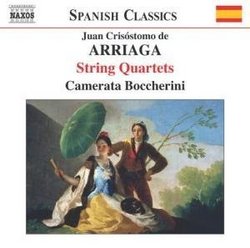| All Artists: Juan Crisostomo Arriaga Title: Arriaga: String Quartets Members Wishing: 0 Total Copies: 0 Label: Naxos Original Release Date: 1/1/2005 Re-Release Date: 11/15/2005 Genre: Classical Styles: Chamber Music, Historical Periods, Classical (c.1770-1830) Number of Discs: 1 SwapaCD Credits: 1 UPC: 747313262823 |
Search - Juan Crisostomo Arriaga :: Arriaga: String Quartets
 | Juan Crisostomo Arriaga Arriaga: String Quartets Genre: Classical
|
Larger Image |
CD Details |
CD ReviewsStartlingly good quartets by an 18-year-old J Scott Morrison | Middlebury VT, USA | 12/11/2005 (5 out of 5 stars) "Juan Crisóstomo de Arriaga (1806-1826) was, like Mozart, Mendelssohn and Korngold, a child prodigy composer. Until I had heard his Symphony in D and his overture 'Los esclavos felices,' which I reviewed almost two years ago, I had never heard a note of his music, having known his name only. I gave that earlier Naxos CD a very positive review, and you'll find that I am doing the same here. These three string quartets, all written when he was eighteen (and barely a year before his tragic death from pneumonia at the age of 19), are simply magnificent. They also display some progression of his talent from the first to the third. Actually, though, the first has some formal attributes that are a bit unusual for a young composer of the classical school, and it seems clear that had he lived Arriaga would have developed further and possibly become one of the lights of the burgeoning Romantic school just taking off when he died. Arriaga clearly had a talent for writing memorable melodies. But he also had a good grasp of form, enough so that he could alter and bend the usual classical quartet form to his own ends. For instance, he starts the fourth movement of Quartet No. 1 with an adagio introduction, reminiscent of similar passages by Haydn, but then he surprises us by bringing it back, transformed, toward the end of the allegretto rondo that is the main portion of the movement. Also, in the 6/8 minuet of that quartet the first section is written with two accented beats per bar, but in the trio this becomes three beats per bar. Not earth-shaking, to be sure, but still an unusual thing for such a young composer to pull off so effectively. The Second Quartet is probably the most conventional of the three, but the variation movement (II) is really memorable, with a long melancholy main theme that is transformed gradually as we go along. The pizzicato variation is particularly effective. The finale contains two versions of a unison cadenza-like section before and after the exposition. The Third Quartet is most notable for its greater contrapuntal complexity than its predecessors. The second movement, called Pastorale, is possibly my favorite movement of all, not only for its lovely melodic musings, but also its instrumental sophistication. The minuet has much the feel of a dramatic scherzo, although it hews to the minuet form. The scurrying Presto finale is a fitting conclusion to this set of three marvelous quartets by a young composer barely old enough to shave. There have been other recordings of these quartets, but I have not heard them. I am, however, satisfied with these fine performances by the Camerata Boccherini, a group with one American and three Italian string players. They are reportedly playing on 'authentic instruments' and I don't know if that means gut-strung instruments from the period in which the quartets were written. Frankly, they sound like modern instruments to me. The recorded sound is crystal clear. If you buy this CD you will almost certainly not be disappointed. Scott Morrison" Not masterpieces but hghly tuneful R. Rockwell | Brooklyn, NY USA | 11/23/2005 (5 out of 5 stars) "Having enjoyed the other naxos disc with Arriagas symphony, I wanted to check this out. These three quartets are the works of a teenager which demonstrates remarkable skill at an early age. Like many of Mozart's early works these demonstarte potential. Unforunately Arriaga died at age 19. The tunefulness of these quartets is infectios. I most particullarly enjoyed the second with its andante convariaciones which seem to sound like twinkle twinkle. This doesn't belong in the basic classical music colllection but those with interest in Spanish music. Please excuse typos i have a neurologic disease." Arriaga: String Quartets Josephine R. Smalley | Alexandria, VA | 08/12/2006 (4 out of 5 stars) "The skill of the group is excellent but the in the recording the first violin is miked louder than the lower instruments and the lower strings are not as easy to hear. Since I bought this quartet to listen specificially to the 2nd violin part (I am playing that part in my quartet)it is more difficult to hear what I am supposed to play."
|

 Track Listings (12) - Disc #1
Track Listings (12) - Disc #1